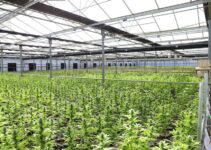I've discovered the significant impact of crop rotation on delta-8 THC production in hemp. Rotating hemp crops offers a multitude of benefits, including improved soil health, enhanced yield, and effective pest management. By implementing this practice, we can optimize nutrient utilization, control weeds, and promote biodiversity. This article delves into the research-backed reasons why rotating hemp crops is crucial for maximizing delta-8 THC production and ensuring the economic viability of hemp cultivation.
Key Takeaways
- Rotating hemp crops for Delta-8 THC production can improve soil health and fertility.
- Crop rotation can help control pests and diseases, reducing the need for pesticides.
- Rotating hemp crops can enhance crop resilience and reduce environmental impact.
- Implementing sustainable farming practices, including crop rotation, can contribute to overall environmental stewardship and economic benefits.
Benefits of Crop Rotation
As a hemp farmer, I have experienced firsthand the significant advantages of implementing a regular crop rotation schedule for enhancing the production of Delta-8 THC in hemp plants. Maximizing yield is crucial in hemp cultivation, and sustainable practices like crop rotation play a pivotal role in achieving this goal. Research has shown that rotating hemp crops with other plants such as legumes or cereals can improve soil structure and fertility, leading to enhanced Delta-8 THC production. Legumes, for instance, fix nitrogen in the soil, which is vital for hemp growth. Furthermore, crop rotation helps in breaking pest and disease cycles, reducing the need for chemical interventions. These sustainable practices not only lead to increased Delta-8 THC yield but also contribute to the overall health of the farm ecosystem. Transitioning into the subsequent section about 'improving soil health', it's evident that crop rotation is a cornerstone of sustainable hemp farming.
Improving Soil Health
Improving soil health through crop rotation is a critical aspect of sustainable agriculture. By balancing crop nutrient needs and cycling, we can enrich the soil with essential elements, leading to improved fertility and productivity. Additionally, crop rotation aids in enhancing soil structure, reducing erosion, and promoting better water retention.
Crop Nutrient Balance
I've found that rotating hemp crops helps maintain a balanced nutrient profile in the soil, promoting overall soil health and improving the quality of the Delta-8 THC produced. Nutrient management and soil fertility are crucial for crop productivity and environmental sustainability. By rotating hemp with other crops like legumes, we can enhance soil fertility through nitrogen fixation, reduce pest and disease pressure, and break weed and disease cycles. This practice optimizes the use of nutrients in the soil and reduces the risk of depletion of specific elements. The table below illustrates the nutrient balance benefits of rotating hemp crops:
| Nutrient | Benefits |
|---|---|
| Nitrogen | Enhances soil fertility, promotes plant growth |
| Phosphorus | Supports root development, improves flower formation |
| Potassium | Enhances stress tolerance, aids in oil production |
Enhancing soil fertility through nutrient management is essential for sustaining high crop productivity and ensuring environmental sustainability.
Moving into the next section, I will delve into the topic of 'soil structure enhancement' to further explore the benefits of crop rotation in hemp farming.
Soil Structure Enhancement
Regularly rotating hemp crops with other plants is essential for improving soil structure and enhancing overall soil health. This practice helps to maintain soil fertility and promotes organic matter buildup, which are crucial for sustaining a healthy growing environment. By cultivating a variety of crops in rotation with hemp, we can prevent soil depletion and erosion while promoting beneficial microbial activity. This method also aids in reducing the build-up of pests and diseases specific to hemp, thereby promoting a more balanced and sustainable ecosystem. Additionally, the diverse root structures of different plants in the rotation help to break up compacted soil, enhance water retention, and improve nutrient availability. These combined effects contribute to the overall enhancement of soil structure and health, making it an integral part of successful hemp cultivation.
Transitioning into the subsequent section about 'pest and disease control', it is important to consider how crop rotation plays a key role in managing these challenges.
Pest and Disease Control
Utilizing crop rotation not only enhances soil health but also serves as a vital strategy for managing pests and diseases in hemp cultivation. 1. Disruption of Pest Cycles: Rotating hemp with different crops can disrupt the life cycles of pests and diseases, reducing their prevalence. 2. Soil Health Improvement: Rotating hemp with cover crops can enhance soil health, promoting beneficial microbial activity that suppresses soil-borne pathogens. 3. Natural Predators: Rotating crops can attract and support natural predators of pests, creating a more balanced ecosystem that controls pest populations. 4. Biological Control: Introducing pest-resistant crops into the rotation can naturally suppress specific pests, reducing the need for chemical interventions. Employing these strategies not only mitigates the risk of pest and disease outbreaks but also promotes a more sustainable and environmentally friendly approach to hemp cultivation.
This integrated approach to pest and disease management through crop rotation aligns with sustainable agricultural practices, ensuring a holistic and effective strategy for maintaining crop health.
Pest and Disease Management
As we explore the importance of pest and disease management in hemp crop rotation, it's crucial to consider the impact on crop resilience and the effective minimization of pesticide usage. Research has shown that rotating hemp crops can help reduce pest populations and inhibit the spread of diseases, ultimately contributing to a more sustainable and resilient agricultural system. By strategically implementing crop rotation, we can mitigate the need for excessive pesticide application, promoting a healthier environment and safer produce for consumers.
Crop Resilience and Rotation
To maintain crop resilience and effectively manage pests and diseases, I implement a strict rotation schedule for my hemp crops. This practice involves alternating hemp with other crops such as legumes, cereals, and cover crops. Here's why this approach is crucial:
- Pest and Disease Control: Crop rotation disrupts the life cycles of pests and pathogens, reducing their buildup in the soil and minimizing the need for chemical interventions.
- Soil Health and Fertility: Diverse crop rotations enhance soil structure, microbial activity, and nutrient cycling, promoting overall soil health and fertility.
- Weed Suppression: Rotating hemp with other crops can help control weeds by breaking their life cycles and reducing weed pressure.
- Environmental Sustainability: Diversifying crop rotations reduces the environmental impact of agriculture, including erosion, nutrient runoff, and pesticide usage.
Minimizing Pesticide Usage
My hemp crop's rotation schedule plays a crucial role in minimizing pesticide usage for pest and disease management. By implementing sustainable agriculture practices, such as crop rotation, I can reduce the environmental impact of pesticide usage while maintaining the health and productivity of the soil. Through this approach, I can effectively manage pests and diseases while minimizing the need for chemical interventions. This not only contributes to reduced environmental impact but also aligns with sustainable agriculture practices, promoting long-term soil health and ecosystem stability. The table below illustrates the benefits of crop rotation in minimizing pesticide usage and its positive impact on sustainable agriculture practices.
| Benefits of Crop Rotation in Minimizing Pesticide Usage |
|---|
| Reduced reliance on chemical pesticides |
| Preservation of natural predators and biodiversity |
| Prevention of pesticide resistance in pests |
Nutrient Management
Implementing proper nutrient management is essential for maximizing the quality and yield of hemp crops used in Delta-8 THC production. To achieve this, several key factors need to be considered:
- Nutrient Cycling: Implementing crop rotation and cover cropping practices to enhance soil fertility and maintain nutrient balance.
- Soil Fertility: Monitoring and managing soil pH levels, as well as conducting regular soil tests to ensure the availability of essential nutrients.
- Organic Matter: Incorporating organic matter into the soil to improve its structure, water retention, and nutrient availability for hemp plants.
- Nutrient Availability: Employing precision agriculture techniques to optimize the availability and uptake of nutrients by hemp crops.
Increasing Delta-8 THC Yield
Employing strategic nutrient management practices has allowed me to consistently increase the yield of Delta-8 THC from my hemp crops. Increasing cannabinoid potency and optimizing crop yield requires a multi-faceted approach. Firstly, selecting high-CBD hemp strains with the potential for high Delta-8 THC conversion is crucial. Additionally, ensuring optimal growing conditions, such as proper irrigation, adequate light exposure, and suitable temperature and humidity levels, is essential for maximizing cannabinoid production. Implementing precise harvesting techniques at the peak of cannabinoid production and employing efficient extraction methods further contribute to increasing the Delta-8 THC yield. Understanding the intricate relationship between cannabinoids, plant physiology, and environmental factors is pivotal in achieving higher Delta-8 THC yields. Through meticulous attention to detail and a comprehensive understanding of plant biology, it is possible to consistently enhance the production of Delta-8 THC in hemp crops.
Sustainable Farming Practices
To achieve sustainable farming practices for Delta-8 THC production, rotation of hemp crops is essential. This practice minimizes the environmental impact and ensures long-term sustainability. The benefits of rotating hemp crops include:
- Soil Health: Rotating hemp with other crops helps maintain soil fertility and reduces the risk of soil-borne diseases.
- Pest and Disease Management: Crop rotation disrupts pest and disease cycles, reducing the need for chemical interventions.
- Weed Control: Rotating hemp with other crops can help break weed cycles and minimize the development of herbicide-resistant weeds.
- Nutrient Management: Different crops have varying nutrient needs, and rotation helps prevent nutrient depletion while promoting efficient nutrient utilization.
These measures are crucial for sustainable Delta-8 THC production and contribute to overall environmental stewardship. Now, let's delve into effective weed control strategies.
Weed Control Strategies
Implementing effective weed control strategies is crucial for maintaining the health and productivity of hemp crops. Crop rotation benefits not only help in managing weed populations but also contribute to overall soil health. By understanding the impact of different pests and diseases on hemp cultivation, farmers can develop targeted weed control strategies to optimize crop yield and quality.
Crop Rotation Benefits
I've found that crop rotation benefits, specifically weed control strategies, play a crucial role in maintaining the health and productivity of hemp crops for Delta-8 THC production. Here are some reasons why implementing crop rotation is essential for weed control strategies:
- Improving Fertility: Crop rotation helps improve soil fertility by alternating hemp with other crops that have different nutrient needs, reducing weed competition and promoting healthier hemp growth.
- Long-Term Sustainability: Implementing crop rotation reduces the build-up of weeds that are specific to hemp, ensuring the long-term sustainability of hemp cultivation while minimizing the need for herbicides.
- Diversity in Weed Control: Rotating hemp with different crops disrupts the life cycles of weeds, making it more challenging for them to establish and spread within the hemp fields.
- Reduced Herbicide Resistance: By incorporating crop rotation, the reliance on herbicides for weed control is minimized, reducing the likelihood of herbicide resistance developing in weed populations.
Pests and Diseases
While implementing crop rotation for Delta-8 THC production, it is important to address weed control strategies to mitigate pests and diseases. Crop rotation plays a crucial role in pest resistance and soil fertility, which are essential for yield optimization in hemp cultivation. By rotating hemp with other crops, we can disrupt the life cycles of pests and diseases, reducing their buildup in the soil. Additionally, different crops have varying nutrient requirements, and rotating hemp with complementary crops can improve soil fertility and reduce the likelihood of specific pests and diseases. Integrated weed management strategies, such as using cover crops, mulching, and mechanical cultivation, can further aid in controlling weeds and minimizing the risk of disease outbreaks. These strategies not only support the health of the hemp plants but also contribute to sustainable and environmentally friendly farming practices.
Soil Health Maintenance
To maintain soil health and control weeds, I rotate hemp crops with complementary plants and employ integrated weed management strategies. This approach helps in maintaining fertility and promoting crop diversity, which are crucial for sustainable agriculture. Here are four key strategies I implement:
- Crop Rotation: I rotate hemp with nitrogen-fixing legumes like clover to improve soil fertility and reduce weed pressure.
- Cover Crops: Planting cover crops such as rye or buckwheat suppresses weeds, improves soil structure, and adds organic matter.
- Mulching: Organic mulches like straw or wood chips not only control weeds but also enhance soil moisture retention and microbial activity.
- Mechanical Cultivation: I use specialized equipment to mechanically control weeds, minimizing the need for herbicides.
Enhancing Biodiversity
As a hemp farmer, I constantly seek ways to enhance biodiversity in my crops to promote a healthier and more sustainable ecosystem for Delta-8 THC production. Biodiversity promotion is crucial for ecological sustainability, as it contributes to the overall resilience of the agricultural system. By rotating hemp crops with other plant species, I can prevent the depletion of specific nutrients in the soil, reduce the risk of pest and disease outbreaks, and support a wider range of beneficial organisms such as pollinators and natural predators. This rotational approach helps maintain a balanced and diverse ecosystem, ultimately leading to increased soil fertility and improved crop health. Additionally, a diverse range of plants can provide habitat and food sources for various organisms, further enriching the overall biodiversity of the farm.
Minimizing Soil Erosion
I routinely employ cover crops and contour plowing to effectively minimize soil erosion on my hemp farm. This proactive approach to soil conservation and erosion control is essential for maintaining the long-term productivity and sustainability of the land. Here are the key strategies I implement:
- Cover Crops: Planting cover crops such as clover and rye between hemp growing seasons helps hold the soil in place, reduces surface runoff, and improves soil structure.
- Contour Plowing: By plowing across the slope contour instead of up and down, I minimize soil disturbance and prevent water from flowing downhill, reducing erosion.
- Terracing: Constructing terraces on sloping land helps to slow down water runoff, reducing soil erosion and allowing for better water penetration.
- Windbreaks: Strategically planting trees and shrubs helps to reduce wind erosion and protect the soil from being blown away.
These practices are crucial for maintaining the health and integrity of the soil, ensuring the continued success of the hemp farm.
Transitioning from soil conservation to economic viability, it is important to understand the economic benefits of these practices.
Economic Viability
Transitioning from soil conservation to economic viability, the implementation of these practices ensures the long-term profitability and sustainability of my hemp farm. By rotating hemp crops for Delta-8 THC production, I not only minimize soil erosion but also tap into the economic benefits of meeting the increasing market demand for Delta-8 THC products. The economic viability of this approach is underscored by the potential for higher returns on investment and the ability to diversify product offerings to align with market trends. To illustrate, the table below outlines the economic benefits of rotating hemp crops for Delta-8 THC production, showcasing the potential for increased revenue streams and enhanced market competitiveness.
| Economic Benefits of Rotating Hemp Crops for Delta-8 THC Production | |||
|---|---|---|---|
| Higher ROI | Diversified Product Line | Increased Revenue | Enhanced Market Competitiveness |
This strategic shift not only aligns with sustainable agricultural practices but also positions my hemp farm for long-term success in meeting market demands while maximizing economic returns.
Frequently Asked Questions
How Does Crop Rotation Specifically Impact the Production of Delta-8 Thc?
Crop rotation impacts delta-8 THC production by improving soil fertility and adapting to climate conditions. This practice enhances nutrient availability and reduces disease pressure, ultimately optimizing hemp crop health and cannabinoid yield.
Are There Any Specific Soil Health Improvements That Are Particularly Beneficial for Delta-8 THC Production?
Soil fertility is crucial for delta-8 THC production. Nutrient cycling through crop rotation improves soil health, enhancing fertility and nutrient availability. This supports robust hemp growth and higher cannabinoid yield, benefiting delta-8 THC production.
What Are the Unique Pest and Disease Management Challenges When Growing Hemp for Delta-8 Thc?
When growing hemp for Delta-8 THC, pest management becomes crucial. It's vital to control pests like mites and aphids to ensure a healthy crop. Disease control is also important, requiring vigilance to maintain soil fertility and nutrient balance.
Are There Specific Nutrients That Are Particularly Important for Maximizing Delta-8 THC Yield?
Maximizing yield in delta-8 THC production requires precise nutrient management. Key nutrients like nitrogen, phosphorus, and potassium play crucial roles in plant growth and cannabinoid production. Balancing these nutrients optimally enhances overall yield potential.
How Does Sustainable Farming Practices Directly Impact the Quality of Delta-8 THC Produced?
Sustainable farming practices, like crop rotation, play a crucial role in maintaining soil fertility and promoting water conservation. These practices directly impact the quality of delta-8 THC produced by ensuring optimal growing conditions and environmental sustainability.
Conclusion
In conclusion, rotating hemp crops for delta-8 THC production offers a range of benefits, including improved soil health, better pest and disease management, increased yield, and enhanced biodiversity. By implementing weed control strategies and minimizing soil erosion, farmers can maximize the economic viability of their operations. These research-driven practices not only contribute to the production of high-quality delta-8 THC, but also support sustainable and environmentally conscious agricultural practices.





